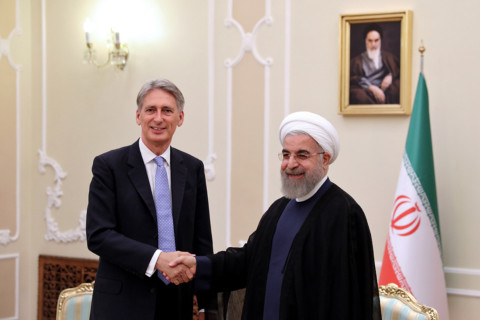
London, Tehran: Britain’s foreign minister said on Monday that Iran is a major regional player that can be an ally in fighting terrorism — but that London must “tread carefully” in its relationship with Tehran.
Tehran and world powers struck a deal last month on Iran’s contested nuclear programme, and on Sunday Britain and Iran reopened their respective embassies after a break of several years.
Foreign Secretary Philip Hammond, who met Iranian President Hassan Rouhani in Tehran on Monday, said the two countries shared common ground despite a “deep legacy of distrust.”
He said they agreed on the need to defeat Daesh, and to stop opium from Afghanistan reaching Europe.
Hammond told the BBC that “Iran is too large a player, too important a player in this region, to simply leave in isolation.”
Rouhani, meanwhile, dismissed any military option against his country’s nuclear program as “ridiculous,” after US President Barack Obama last week said force remained on the table to prevent Iran from getting a nuclear weapon.
“These ridiculous expressions, slogans and irrelevant jokes damage the process of trust-building” between Iran and world powers, Rouhani said during his meeting with Hammond, according to the president’s official website.
Rouhani said world powers will soon learn that engagement with Iran is the “right path.”
Obama has been seeking to address concerns among his fellow Democrats, who will need to support the nuclear deal to prevent the Republican-led Congress from derailing it.
Last week, Obama wrote to a Democratic lawmaker that if Iran rushes to build a nuclear weapon, “all of the options available to the United States — including the military option — will remain available.”
The nuclear deal would curb Iran’s nuclear activities and allow for greater international monitoring in return for sanctions relief. While the historic step marks an easing of tense relations between the Islamic republic and Western powers, Hammond said there was still disagreement on major issues.
“We should tread carefully. There’s a deep legacy of distrust on both sides and we have major areas where we have very substantial policy differences,” he told the BBC shortly before a scheduled meeting with Rouhani.
He said that while both countries agreed on the need to tackle Daesh, there were disagreements on human rights issues.
Hammond said the current Iranian government had displayed a more nuanced approach than its predecessor to a long-running conflict with the Israeli regime, adding that Tehran would be judged on its actions, not its words.
“What we’re looking for is behaviour from Iran, not only towards Israel but towards other players in the region, that slowly rebuilds their sense that Iran is not a threat to them,” he said.
Hammond also said he expected sanctions on Iran could start to be lifted as early as Spring next year.
Preparatory work should be done ahead of lifting sanctions so investment can start to flow as soon as the measures are removed, he said. “We could be talking as early as next spring to start to see sanctions lifting off,” Hammond said.












